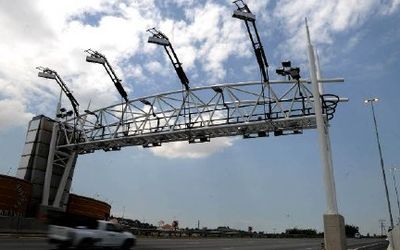THE South African National Roads Agency Ltd (Sanral) is making an all-out effort to collect as much outstanding e-toll debt as possible ahead of its meeting in May with Moody’s Investors Services.
Sanral, which is responsible for the maintenance and construction of national roads, will be assessed by Moody’s over the next few months along with SA as a country, a number of other state-owned companies and government structures.
The ratings agency’s investigation kicked off earlier this month with a meeting with Finance Minister Pravin Gordhan and Treasury officials.
The agency put Sanral’s rating on review for a downgrade earlier this month, along with SA’s own rating. Moody’s had downgraded Sanral’s outlook from stable to negative in January last year, confirming this finding again in July. Key to its assessment was a concern about Sanral’s ability to collect outstanding e-toll debt. Failure to do so would cut the road agency’s cash flows and raise its debt, which was already at R47bn at the end of March last year.
In November, outstanding e-toll debt amounted to R5.9bn and this has probably climbed since then.
Sanral spokesman Vusi Mona said on Monday credit ratings agencies and investors were concerned about a culture of non-payment of e-toll fees.
Sanral had to demonstrate its commitment to collect outstanding debt. Moody’s had clearly stated that Sanral’s rating could be downgraded because of its "inability to effectively enforce e-toll payments, leading to deteriorating cash flows and increased borrowing needs".
"Although everyone — including those opposed to the system and nonpayers — has expressed concern about the impact of a downgrade of the sovereign and individual credit ratings, they fail to see the direct role their actions have on ratings," Mr Mona explained.
To tackle this, the agency announced last week that it would begin issuing civil summonses against persistent defaulters and on Monday issued a statement warning of the expiry of the 60% discount period at the end of next month.
Mr Mona said that current payments of e-toll fees by Gauteng motorists of R80m-R90m a month were below projections, although still higher than the R60m in the August-September period.
The discount on historic e-toll debt would expire at the end of next month.
The once-off discount applies to all unpaid e-tolls levied on the inner-Gauteng highways from the implementation of the e-toll system between December 2013 and August 31 2015.
Mr Mona warned that the discount would not be extended and urged motorists to pay sooner rather than later as there might be a rush at the end of next month, which could see some of those willing to pay lose out on the offer.
He said that the response to the discount offer had so far been encouraging, but it would be possible to gauge its success only at the end as many motorists were waiting until the last minute to take up the offer. He said some payments would come in after the deadline because of the payment arrangements some motorists were entering into in order to clear their records.
Mr Mona said fewer than 20% of defaulting road users contacted for collection flatly refused to pay.
Some people and businesses have indicated that they are delaying payment for as long as possible for them to "earn" interest on the money.






















Change: 1.37%
Change: 1.32%
Change: 2.91%
Change: 0.45%
Change: 3.09%
Data supplied by Profile Data
Change: 1.59%
Change: 0.47%
Change: 1.37%
Change: 0.00%
Change: 0.44%
Data supplied by Profile Data
Change: 0.22%
Change: -0.05%
Change: 0.04%
Change: 0.23%
Change: 0.00%
Data supplied by Profile Data
Change: 0.26%
Change: 0.31%
Change: 0.13%
Change: 0.36%
Change: -0.74%
Data supplied by Profile Data